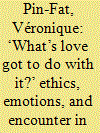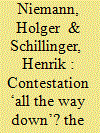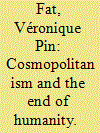|
|
|
Sort Order |
|
|
|
Items / Page
|
|
|
|
|
|
|
| Srl | Item |
| 1 |
ID:
164974


|
|
|
|
|
| Summary/Abstract |
By paying attention to love, this article offers a grammatical reading of International Relations’ founding grammar of inside/outside as an ethics of encounter. The decision to focus on love is, I suggest, to contend with the possibility that IR may express a lethal politics and ethics. I seek to substantiate this claim through an unsettling reading of neo-Jamesian contributions to the emotional turn. I conclude that the discipline’s founding grammar is an ‘avoidance of love’ and offer a reminder that an alternative way of loving is possible.
|
|
|
|
|
|
|
|
|
|
|
|
|
|
|
|
| 2 |
ID:
151646


|
|
|
|
|
| Summary/Abstract |
The meaning of norms is empirically contested. Supposing an inherent instability of norm meaning, contestation, therefore, represents a fundamental conceptual challenge to the mainstream view on norms as shared understandings. By offering a grammatical reading of Antje Wiener’s approach to contestation, we examine how norm research addresses this challenge to its theoretical core assumption. We argue that the grammar of Wiener’s approach, despite its reflexive starting point, ultimately reintroduces an understanding of norms as facts and leads to a normative ‘politics of reality’. This effectively turns contestation into a disruption of the ‘normal’ state of norms. Demonstrating the challenges of theorising norms with rather than against contestation, the article concludes that norm research has yet to find ways to account for contestation ‘all the way down’ in order to sustain norms as a productive analytical concept in IR.
|
|
|
|
|
|
|
|
|
|
|
|
|
|
|
|
| 3 |
ID:
124422


|
|
|
|
|
| Publication |
2013.
|
| Summary/Abstract |
The academic discipline of International Relations has yet to systematically begin tracing the impact of posthumanism on ethics in global politics. In a context where a humanist picture of the subject is in "a state of crisis that is more acute than ever," and the "end of humanity" is being declared by some, the question arises as to whether a moral commitment to liberal cosmopolitanism can be maintained. It arises because the moral commitments of cosmopolitanism traditionally rest on a humanist foundation, and posthumanism, at first glance, seems an obvious threat to it. In this article, rather than reading posthumanism as a threat to humanity, I read humanism as the threat. I propose that, tricky though it may be, a cosmopolitanism that embraces the end of humanity can be formulated and defended as a moral commitment to humanity: a cosmopolitanism without foundations. This cosmopolitanism without foundations is, I suggest, one way to overcome the skeptic's fantasy that we are hidden from each other, and with it the belief that our primary relation to the world is one of knowledge anchored to foundational promises of certainty. Instead, a life lived in the world with others is proposed, and with it a cosmopolitan commitment to humanity as an unavoidable ethical responsibility.
|
|
|
|
|
|
|
|
|
|
|
|
|
|
|
|
|
|
|
|
|